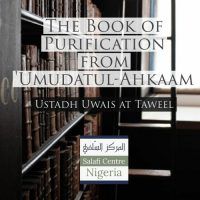
Lesson 23: Book of Purification from Umdatul-Ahkam – Uways at-Taweel
Explanation of the Hadeeths 6, 7 & 8 from the Chapter of Ghusl (ritual bath) from Janābah (sexual impurity); and Hadeeths 1, 2 & 3 from the Chapter of Tayammum:
Chapter of Ghusl from Janābah:
Hadeeth #6:
‘Ā’ishah (رضي الله عنها) narrated: “I used to wash the remnants of Janabah (semen) from the clothes of the Messenger of Allāh ﷺ and then he would go to pray while traces of water were still on his clothes (water spots were still visible).”
And in another wording of the hadeeth in Sahīh Muslim: “I used to scratch it (semen) off the clothes of the Messenger of Allāh ﷺ and then he would pray in them.”
Hadeeth #7:
Abu Hurairah (رضي الله عنه) narrated that the Messenger of Allāh ﷺ said: “If one of you sits between the four limbs (of his wife) and penetrates her, then Ghusl becomes obligatory.”
And in another wording of the hadeeth in Saheeh Muslim: “Even if he did not ejaculate.”
Hadeeth #8:
Abu Ja’far Muhammad ibn ‘Alī ibn Al-Husain ibn ‘Alī (رضي الله عنهما) narrated that while he and his father were with Jābir ibn ‘Abdullāh (رضي الله عنهما) some people asked him about Ghusl and he replied: “A Sā’ (of water) is sufficient for you.” A man said: “A Sā’ is not sufficient for me.” So Jābir responded: “A Sā’ was enough for one who had more hair than you and who was better than you – meaning the Messenger of Allāh ﷺ. And then he (Jābir) led us (in prayer) in a single thobe.”
And in another wording of the hadeeth: “The Messenger of Allāh ﷺ used to pour water over his head 3 times.”
The author said: The man who said: “(A Sa’) is not sufficient for me.” was Al-Hasan ibn Muhammad ibn ‘Alī ibn Abī Taalib (رضي الله عنه) and his father was Muhammad ibn Al-Hanafiyyah.
Several points discussed, including:
- Brief biographies of Jābir ibn ‘Abdullāh (may Allah be pleased with them both) and others from the Tabi’een
- The purity of Semen
- Obligation of Ghusl after sexual intercourse even when ejaculation does not occur
Chapter of Tayammum:
Hadeeth #1:
‘Imrān ibn Hus̩ain (رضي الله عنه) narrated that: The Messenger of Allāh ﷺ saw a person sitting aloof and didn’t pray with the people. So he asked him: “O so and so! What prevented you from praying with the people?” He answered: “O Messenger of Allāh, I am Junub, and there is no water.” So, he ﷺ responded: “Upon you is to use clean earth (i.e. perform Tayammum), and that would be sufficient for you.”
Hadeeth #2:
‘Ammār ibn Yāsir (رضي الله عنهما) narrated: “The Prophet ﷺ sent me on an errand and I became Junub and didn’t find water. So I rolled in the dirt like an animal would. I then came to the Prophet ﷺ and informed him about that. So he said: “It would have been sufficient for you to do like this with your hands – so he struck the earth with both his hands one time, and then wiped the right hand with the left and the outer parts of his hands and his face.”
Hadeeth #3:
Jābir ibn Abdullāh Al-Ansārī (رضي الله عنهما) narrated that the Prophet ﷺ said: “I have been given five things which were not given to any of the Prophets before me: (1) I have been aided by fright (in the hearts of his enemies) from the distance of a month’s journey; (2) the entire earth has been made a place of praying and a means of purification so anyone from my Ummah who the time prayer meets him, then let him pray (wherever he is); (3) the spoils of war have been made permissible for me whereas it was not permissible for Prophets before me; (4) I have been granted the (Great) Intercession; (5) and a Prophet used to be sent to his people specifically but I have been sent to all of mankind.”
Several points discussed, including:
- Brief biographies of the noble companions: ‘Imran ibn Husayn, ‘Ammar ibn Yasir, and his father (may Allah be pleased with them all)
- The meaning of Tayammum
- The ruling of tayammum from Janābah and how it is to be performed
The class was held on Saturday, 13th of Sha’ban, 1442 (March 27th, 2021).
ablution, hadeeth, purification, umdatul-ahkam, Uwais At-Taweel, wudoo